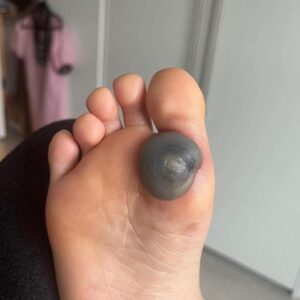“My sister preps a huge bowl of tuna salad and keeps it for 1 week. I usually won’t touch it after day 3. How long is tuna salad safe in the fridge?”
That’s how the conversation started. Just an innocent question over text from me to my sister, Peregrine. She’d always been the meticulous one—labeling leftovers, freezing soup in perfect portions, lining up the pantry like a grocery store shelf. I was the opposite. I lived with a foot out the door, never sure where I’d end up on a Friday night. But we’d been living together for the past six months since I’d lost my job at the advertising firm.
Peregrine was patient. She never nagged me about rent or chores, just quietly cleaned up my messes, both literal and emotional. We didn’t talk much about why I was still jobless or what I was doing to change that. I pretended I was fine. She pretended she believed me.
When I texted about the tuna salad, she responded right away: “Technically 3-5 days, but if it smells off, toss it.” Then she added, “Are you okay?”
I almost told her the truth. That I’d spent the last three days sitting on the couch, rewatching old basketball games, feeling too embarrassed to send out my resume. But I couldn’t bring myself to type it out. I just replied with a thumbs-up emoji.
That night, I was staring at the tuna salad in the fridge, picking at it with a fork. I knew it was past day three. But something in me wanted to see what would happen. I felt like I was rotting in the same way, so why not eat something that might be a little bad?
But right then, Peregrine came home early from work. She walked into the kitchen and caught me sniffing the bowl like a raccoon. She sighed and said, “You know, you don’t have to punish yourself by eating questionable tuna.”
I looked at her, surprised. “What are you talking about?”
She took the bowl from my hands and dumped it down the sink. “I know you’re struggling,” she said softly. “I’ve been waiting for you to talk to me.”
The next morning, she sat with me at the kitchen table. We wrote out everything I needed to do: update my resume, apply for three jobs a day, take a shower every morning. She added “eat fresh food” as a joke, but it made me laugh for the first time in weeks.
Over the next few days, she held me to it. Every morning, she checked in with me. Some days I didn’t do much, but some days I sent out a few applications. Slowly, it felt like I was getting traction again.
One afternoon, a recruiter called about a job in marketing for a local startup. They wanted an interview. I almost let it go to voicemail out of fear, but Peregrine yelled from the other room, “Answer it!” So I did.
The interview was set for the next day. I was terrified, but Peregrine helped me pick out an outfit that wasn’t a hoodie. She grilled me with mock interview questions until I could answer without stammering.
When I came back from the interview, she was waiting with takeout sushi. “I thought we’d skip tuna salad for a while,” she joked. I told her the interview had gone better than expected. We celebrated with cheap sparkling water.
A week later, I got the job offer. It wasn’t a dream position, but it was something. Peregrine jumped up and hugged me. We both cried a little. It felt like the first time in months I could breathe.
As I settled into my new job, I noticed things I’d ignored before. Peregrine looked tired all the time. She had dark circles under her eyes. One night, I heard her crying in her room. I knocked and found her sitting on the floor, surrounded by unpaid bills.
She confessed she’d been covering my share of the rent and utilities. She’d maxed out two credit cards trying to keep us afloat while I spiraled. My stomach twisted with guilt.
I promised her I’d pay her back every cent. We made a plan together, just like we’d made a plan for my job hunt. I took on extra freelance work at night. She picked up extra shifts on weekends. We budgeted carefully and stuck to it.
One Saturday, I made her favorite meal—chicken piccata—and we sat down to go over the bills. We realized we’d finally paid off her credit cards. We both burst into relieved laughter.
Things started feeling normal again. But one evening, we got a knock at the door. It was our neighbor, Regan. He was pale and shaking. His partner had left him suddenly, and he didn’t know who else to turn to. Peregrine invited him in without hesitation. We listened as he poured out his story.
Seeing how Peregrine comforted Regan reminded me of how she’d been there for me. I realized how rare and precious her kindness was. I vowed to do the same for others whenever I could.
A couple of weeks later, I got promoted. My boss said they were impressed by my creativity and work ethic. I used the raise to surprise Peregrine with a weekend trip to the coast, somewhere she’d always wanted to go.
On the beach, as we watched the sun set, she turned to me. “I’m proud of you,” she said quietly.
I finally understood how much that meant coming from her. She wasn’t just proud of the job I’d gotten, but of the person I’d become—someone who could take care of themselves and others.
The day we got back, Regan dropped by again. He handed us a pie he’d baked as thanks for listening to him. We invited him in, and soon our apartment felt like a warm, supportive place—a small community of people who looked out for each other.
One evening, I found Peregrine prepping a fresh bowl of tuna salad. I teased her, “We learned nothing, huh?” She grinned, “Oh, I’ll finish it before day three.”
That moment made me think about how much had changed since the first tuna salad conversation. I had a job, I was paying my bills, and I felt hopeful for the first time in a long while.
But then came a twist we didn’t expect. Peregrine got a call from her boss saying her division was being shut down. She was being laid off effective immediately. I could see the fear in her eyes—the same fear I’d felt months ago.
This time, it was my turn to step up. I sat her down and said, “Let’s start small.” We made a plan: update her resume, network with people she knew, apply for jobs each day. I cooked for her, reminded her to shower, and stayed positive even when she was discouraged.
She struggled for weeks. She got rejection after rejection. But one afternoon, she got a call from an old colleague who’d heard she was looking. They offered her a position better than the one she’d lost.
She screamed with joy, and I danced around the kitchen with her. We ordered pizza and laughed until our sides hurt.
I realized in that moment how things come full circle. She had saved me, and now I had helped her. We were stronger because we leaned on each other.
A month later, Peregrine and I organized a small dinner with our closest friends, including Regan, to celebrate how far we’d come. Everyone brought something homemade. We sat around the table, sharing stories and laughing until late into the night.
I looked around and realized I wasn’t just surviving anymore—I was living, connected, and grateful.
The biggest lesson I took away from it all was that we don’t always stay down forever. But getting back up is easier when someone believes in you, even when you can’t believe in yourself.
Now, when someone asks me how long tuna salad is safe in the fridge, I smile and say, “Three days max—and don’t forget to check on your people, too.”
Because the truth is, life spoils just like tuna if you leave it alone too long. But with care, connection, and a little faith, you can make things fresh again.
If this story moved you, please share it with someone who might need a reminder that they’re not alone—and don’t forget to like the post so more people can see it!





